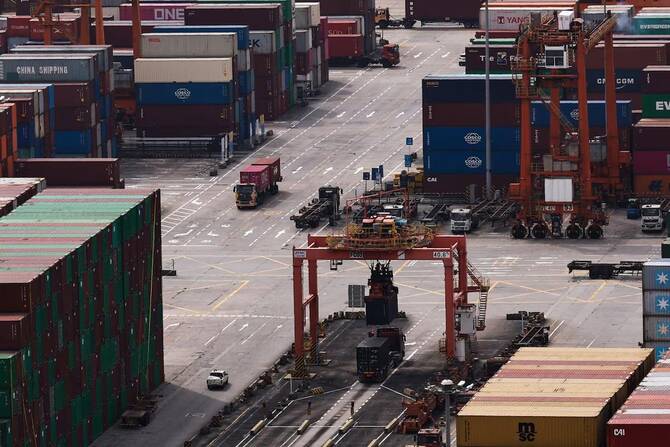BEIJING: China on Monday accused Washington of abusing tariffs and warned countries against striking a broader economic deal with the US at its expense, ratcheting up its rhetoric in a spiralling trade war between the world’s two biggest economies.
Beijing will firmly oppose any party striking a deal at China’s expense and “will take countermeasures in a resolute and reciprocal manner,” its Commerce Ministry said.
The ministry was responding to a Bloomberg report, citing sources familiar with the matter, that the Trump administration is preparing to pressure nations seeking tariff reductions or exemptions from the US to curb trade with China, including imposing monetary sanctions.
President Donald Trump paused the sweeping tariffs he announced on dozens of countries on April 2, except those on China, singling out the world’s second-largest economy for the biggest levies.
In a series of moves, Washington has raised tariffs on Chinese imports to 145 percent, prompting Beijing to slap retaliatory duties of 125 percent on US goods, effectively erecting trade embargoes against each other. Last week, China signalled that its own across-the-board rates would not rise further.
“The United States has abused tariffs on all trading partners under the banner of so-called ‘equivalence’, while also forcing all parties to start so-called ‘reciprocal tariffs’ negotiations with them,” the ministry spokesperson said.
China is determined and capable of safeguarding its own rights and interests, and is willing to strengthen solidarity with all parties, the ministry said.
“The fact is, nobody wants to pick a side,” said Bo Zhengyuan, partner at China-based policy consultancy Plenum.
“If countries have high reliance on China in terms of investment, industrial infrastructure, technology know-how and consumption, I don’t think they’ll be buying into US demands. Many Southeast Asian countries belong to this category.”
Pursuing a hardline stance, Beijing will this week convene an informal UN Security Council meeting to accuse Washington of bullying and “casting a shadow over the global efforts for peace and development” by weaponizing tariffs.
Earlier this month, US Trade Representative Jamieson Greer said nearly 50 countries have approached him to discuss the steep additional tariffs imposed by Trump.
Several bilateral talks on tariffs have taken place since, with Japan considering raising soybean and rice imports as part of its talks with the US while Indonesia is planning to increase US food and commodities imports and reduce orders from other nations.
CAUGHT IN CROSSFIRE
Trump’s tariff policies have rattled financial markets as investors fear a severe disruption in world trade could tip the global economy into recession.
On Monday, Chinese stocks inched higher, showing little reaction to the commerce ministry comments, though investors have generally remained cautious on Chinese assets due to the rising growth risks.
The Trump administration also has been trying to curb Beijing’s progress in developing advanced semiconductor chips which it says could be used for military purposes, and last week imposed port fees on China-built vessels to limit China’s dominance in shipbuilding.
AI chip giant Nvidia said last week it would take $5.5 billion in charges due to the administration’s curbs on AI chip exports.
China’s President Xi Jinping visited three Southeast Asian countries last week in a move to bolster regional ties, calling on trade partners to oppose unilateral bullying.
Beijing has said it is “tearing down walls” and expanding its circle of trading partners amid the trade row.
The stakes are high for Southeast Asian nations caught in the crossfire of the Sino-US tariff war, particularly given the regional ASEAN bloc’s huge two-way trade with both China and the US.
Economic ministers from Thailand and Indonesia are currently in the US, with Malaysia set to join later this week, all seeking trade negotiations.
Six countries in Southeast Asia were hit with tariffs ranging from 32 percent to 49 percent, threatening trade-reliant economies that have benefited from investment from levies imposed on Beijing by Trump in his first term.
ASEAN is China’s largest trading partner, with total trade value reaching $234 billion in the first quarter of 2025, China’s customs agency said last week.
Trade between ASEAN and the US totalled around $476.8 billion in 2024, according to US figures, making Washington the regional bloc’s fourth-largest trading partner.
“There are no winners in trade wars and tariff wars,” Xi said in an article published in Vietnamese media, without mentioning the US.
















